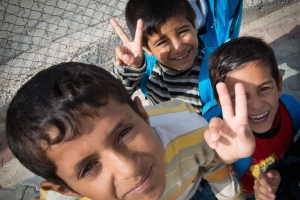Discours
20 Novembre 2015
Paneldebate IOM - Introduction (Brussels)
Dear Ambassador Swing,
Excellencies,
Ladies and Gentlemen,
Welcome to this outreach event that Belgium organizes together with the International Organization for Migration.
We have an interesting panel today to explore with you solutions to the protracted migration and refugee crises.
Over 60 million people are forcibly displaced. They are currently fleeing war, terror and persecution. Today, one in every 122 persons worldwide is a refugee, internally displaced or seeking asylum. A staggering number.
Never before since the Second World War that many people have been forced to leave their home. Not only because of violent conflicts but also because demographic growth, the effects of globalization, food insecurity, climate change and human rights violations.
The situations people flee from, take increasing time to be resolved. And the truth is that some of the most intense conflicts will probably not be resolved in the short term. The result: longer periods of displacement.
Large displacement situations take currently an average of 17 years. But we all know the situations where people have been displaced for 20, even 30 years. Situations where children are born as refugees and grow to adulthood as refugees.
For these people life continues. They hold dreams and hopes. They want to know what their future holds. They want to give their children a perspective. If we leave them in despair, we are brutally creating not one but many lost generations. We cannot let this happen.
In every successful strategy the role of host countries is fundamental.
Host countries should be reinforced with capacities to ensure protection, local integration and access to services. This should be combined with other responses such as resettlement, relocation and if possible, return.
It is imperative that these host countries, especially when they are hosting large numbers of displaced people, remain beacons of security and stability.
Yet, very often these countries, think of Lebanon today, fall beside the traditional access to development funding because they are middle-income countries. Then, it is important that these countries can rely on organizations such as IOM. Organizations that offer assistance and open up and expertise to guide these countries through tumultuous times.
Belgium is convinced that funding IOM is money well spent. That’s why we, since quite a number of years, deliberately are providing core funding to IOM. Core funding, because we belief that by not earmarking our funding, IOM can operate based on needs and not on bureaucratic rules. We also do hope that in providing core funding, we help to overcome some of the difficulties to move from humanitarian assistance to development.
Ladies and gentlemen,
Belgium is strengthening its humanitarian efforts. We provide large amounts of humanitarian aid. This year our humanitarian aid budget peaked at an unprecedented 150 million euro. Efforts, we will intensify next year with an increased budget of 170 million in total.
But this is not enough. We also have to address the root causes of forced displacement. Belgium is committed to do so.
We are supporting the set-up of the asylum and reception system in Morocco. And last week, we pledged 10 million euro to the European Trust Fund on Migration. Together with the Netherlands and Italy the most important contribution of European member states.
We are also addressing human rights violations including early and forced marriage, female genital mutilation and discrimination against LGBTs. We should never forget that fundamental human rights are migrant’s rights too.
And let us not forget the potential of digital solutions. The digital age opens up new possibilities, also for migration policies. Digital platforms can increase the distribution of information, screening, and access to jobs. Through connecting people, digital technology acts as a lifeline for displaced people as we are seeing for instance today within our own refugee population.
Ladies and Gentlemen,
In a couple of days, Belgium takes over the presidency of the IOM. This is a true privilege. IOM is thé reference in the international community when it comes to migration. The IOM-presidency offers our country a unique opportunity to get even more engaged in the international migration debate. With a clear focus on providing solutions, assuming our international obligations, and building a future for millions people that are on the run for years.
“Migration is a fact, it should be managed in an orderly and safe fashion”. I entirely share this premise of Ambassador Swing.
It is with migration as with traffic. Cars are moving in all directions, but we do not say traffic is ‘good’ or ‘bad’. We manage traffic, so that people are driving safely and congestions are solved (at least that’s the objective). Migration is faced with the same challenge: to be managed so that migration is safe migration.
Dear all, I hope this afternoon’s debate will shed light on some of the points I have briefly touched upon. We all look forward to the exchange of ideas and I am optimistic we will get inspired and move to joint action.
Thank you.


